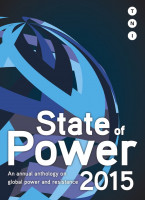Abstract
This essay presents a conceptual perspective on the dominant and novel logic informing today’s social movement-based counter-power. Drawing on Deleuze and Guattari’s image of the rhizome, this essay analytically accentuating the nature and workings as well as the challenges and shortcomings of contemporary movement-based counter-power.
This “Rhizomatic Movement Logic” has been emerging in conjunction with shifting dynamics of neoliberal capitalism as well as in conversation with older forms of left movement-based counter power. It thrives on multiplicity and thus lacks a dominant core or main axis and emphasizes radical participatory democracy and horizontal organizational forms, media and communication tools, multi-connectivity and heterogeneity of political struggles, with no central actor, issue, strategy, or ideology beyond opposition to a neoliberal society. Moreover, it displays a reluctance to resilient longer-term organizing and (at least in parts of the global north) to making policy demands on the state.
Introduction
The last decades have seen massive protests and mobilizations against rising inequality, war, the dispossession of rights and entitlements, democratic deficits and austerity politics, ranging from the so-called “bread riots” of the 1970s and 1980s against the International Monetary Fund’s structural adjustment programs in the global south to the massive one million strong demonstrations in Korea in 1984, the 1988 Berlin and 1989 Paris mobilizations, the founding of such networks and coalitions as Via Campesina and the Coalition of Immokalee Workers in 1993, the Zapatista uprising in Chiapas since the mid- 1980s, mass demonstrations against war and inequality at virtually all gatherings of world leaders, the launching of the World Social Forum and the global social forum process it has sparked, to the struggles in North Africa and Occupy Wall Street and anti-austerity type mobilizations to the incipient anti-racism uprisings in the U.S. Fed by two main dimensions – first, an economic angle, spanning struggles against corruption and inefficiencies to challenging capitalism itself and second, a political-ideological thrust, ranging from demanding democracy to demands that conventional representative multi- party democracy be overthrown (Zizek) - protests and social movement organizing from the local to the global has been a world-wide and constant phenomenon.
This essay takes a bird’s-eye view on this “epoch of contention” (Funke, 2014; McAdam & Sewell, 2001) and seeks to present a conceptual perspective on the dominant logic informing today’s counter-power writ large. The amalgamation of social movement based counter-power, I argue, is relying on and enacting a novel and distinct movement logic, which thrives on multiplicity and thus lacks a dominant core or main axis and emphasizes radical participatory democracy and horizontal organizational forms, media and communication tools, multi-connectivity and heterogeneity of political struggles, with no central actor, issue, strategy, or ideology beyond opposition to a neoliberal society and a certain reluctance to resilient longer-term organizing and (at least in parts of the global north) to making policy demands on the state.
Drawing on the work of the two French philosophers and psychotherapists Gilles Deleuze and the Pierre-Félix Guattari, this essay uses their image of the rhizome (think ginger rather than trees) to analytically accentuate the nature and workings as well as the challenges and contemporary shortcomings of today’s social movement-based counter- power. The dominant “Rhizomatic Movement Logic” as I have called it elsewhere (Funke, 2012), has been emerging in conjunction with shifting dynamics of neoliberal capitalism and its related modes of socio-political governance as well as in conversation with older forms of left movement-based counter politics and its concomitant logics.
“Rhizomatic Counter-Power” has been fostering remarkable mobilizations and extraordinary connections and has aided in tempering and managing inherent antinomies between contemporary movements and groups. Simultaneously, however, the particularities of this Rhizomatic Logic are limiting the degree of congealed and resilient movement building and thus the societal transformation potential of counter-power, which the concept of the rhizome also helps to analytically unearth and understand.
This essay begins by sketching the shifting dynamics of capitalism and the related movement logics that have undergird movement-based counter-power in the past to then detail the emergent rhizomatic logic of contemporary formations. While I draw on illustrations from various parts of the world such as the Zapatista, the protests of the alter-globalization and anti-war movements of the 1990s/2000s, the emergence of the World Social Forum and the global social forum process it has sparked (Funke 2012), as well as the “Arab Spring,” anti-austerity protests and encampments around the globe, this essay has a conceptual focus, detailing the particular logic informing counter-power today, which both enable its successes as well as its challenges.


